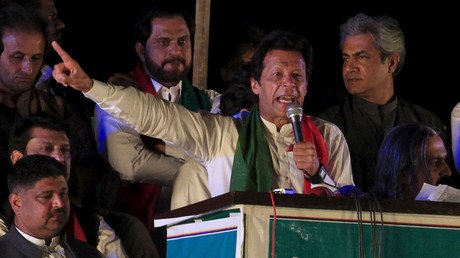Taliban chief Mansour killed in US drone strike – Afghan officials
A US drone strike in Pakistan has killed Afghan Taliban leader Mullah Akhtar Mansour, Afghan government chief Executive and intelligence said. The Taliban has denied Mansour was killed, while critics question the effectiveness of years of targeted Obama-ordered killings.
“Taliban leader Akhtar Mansour was killed in a drone strike ... His car was attacked in [the town of] Dalbandin [in Pakistan]," Afghan government chief Executive Abdullah Abdullah said.
Afghan intelligence also confirmed the death of Taliban chief.
“Akhtar Mansoor, Taliban leader is killed yesterday in an air strike in Dalbandin, Balouchistan [province], Pakistan,” the Afghan National Directorate of Security wrote on Twitter.
#AkhtarMansoor, #Taliban leader is killed yesterday in a air strike in Dalbandine, #Balouchistan, Pakistan. pic.twitter.com/pqd7cCPcod
— NDS Afghanistan (@NDSAfghanistan) May 22, 2016
The mission was signed off on by US President Barack Obama and carried out by American special operations forces. The American drone hit the men traveling in a vehicle, AP cited an official as saying, with Reuters adding that at least one more fighter is presumed killed.
Mansour was “a threat” to peace which US is trying to establish in Afghanistan, US Secretary of State John Kerry said.
"Yesterday, the United States conducted a precision air strike that targeted Taliban leader Mullah Mansour in a remote area of the Afghanistan-Pakistan border. Mansour posed a continuing, imminent threat" to US personnel and Afghans, Kerry said.
YOU MAY FIND VIDEO BELOW DISTURBING
Pentagon spokesman Peter Cook confirmed that an air strike targeting Mansour took place, adding that Mansour was an “obstacle” to establishing peace between Taliban leaders and the Afghan government. However, Cook did not state whether the strike had been successful.
Afghan Chief Executive Abdullah Abdullah said that Mansour was indeed likely killed in the US strike.
Today DoD carried out a precision airstrike targeting Taliban leader Mullah Mansur. Another step to make our troops safer in Afghanistan
— Peter Cook (@PentagonPresSec) May 21, 2016
"Last night, American officials informed the Afghan government and it is very likely that he is killed. As soon as we get more information we will inform our people," he said, as cited by Reuters.
Pakistan, in the meantime, is "seeking clarification" on the US drone strike, the foreign ministry spokesman said.
#Taliban could become legitimate 'political power' in #Kabul - Russian envoy https://t.co/yEMvSZ7Op8pic.twitter.com/0XcKP90NaU
— RT (@RT_com) April 19, 2016
“I have seen the reports. We are seeking clarification,” Nafees Zakaria said in a statement. “Military action is not a solution.”
One commander close to Mansour told Reuters on condition of anonymity that “Mullah Mansour has not been killed.” He added: “We heard about these baseless reports, but this not first time.”
READ MORE ‘US is fighting terrorism in the wrong places’ - former Afghan President Karzai
Mullah Abdul Rauf, a senior commander of the Afghan Taliban, confirmed to AP that Mansour had died in the strike late Friday “in the Afghanistan-Pakistan border area.”
Pakistan’s Samaa TV reported that the airstrike had killed a taxi driver and its passenger, not Mansour. It identified the driver as Muhammad Azam and the passenger as Wali Muhammad, a resident of the town of Chaman on the Pakistan-Afghan border.
Mansour took over the Taliban’s leadership position in July 2015, replacing its founder and spiritual leader Mullah Mohammad Omar, who died in 2013. Notably, the Taliban only confirmed the death of Omar in 2015.
Mansour first joined the Taliban in 1995. There had been reports that Mansour was killed in a battle last year, but they were denied by the Afghan government.
However, critics of US drone strikes have questioned whether Afghanistan will profit from the death of another Taliban leader who will soon be replaced by another, as the prospect of peace between the militants and the government becomes even more remote.
“I’d give them the benefit of the doubt and say they think they have in fact killed the Taliban leader. The question is, ‘What’s the point?’ What’s the military point? Fifteen years since the start of the US invasion in October 2001, more of Afghanistan today is under control of the Taliban than it was then,” Brian Becker, of the anti-war ANSWER coalition, told RT.
To get an Afghan perspective on the developments on the ground, RT talked to Prince Ali Seraj, President of the National Coalition for Dialogue with the Tribes of Afghanistan (NCDTA).
Seraj doubted that the death of Mansour would make much difference for Afghanistan, as he believes Taliban leaders are merely puppets of external forces. According to the Afghan prince, Pakistani authorities are “pushing the buttons” there, all to attract more US support.
"These so-called leaders are just pieces of pawn that the Pakistani ISI [Inter-Services Intelligence] uses for the benefit… so they can take more money from the United States,” he said.














